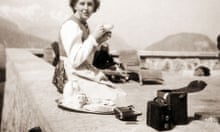For decades she has been seen as a decorative companion to Adolf Hitler, an apolitical "dumb blonde" whose attentions served as an occasional diversion for the Führer. But the first academic biography of Eva Braun draws a different picture of the dictator's long-standing girlfriend, claiming historians have hugely underestimated the role she played in his life.
Berlin historian Heike Görtemaker reveals her as a politically committed woman who won Hitler's affections, enjoyed a healthy sex life with him, sympathised with Nazi politics and gave him psychological support. Görtemaker spent three years researching her book, Eva Braun: Life With Hitler, due out this month from the prestigious CH Beck publishing house. She was able to draw on previously unseen or little-known documents, letters, diary entries and photographs.
"Eva Braun features in films, plays, novels and historical memoirs," Görtemaker told the Observer, "but is always portrayed as the dumb blonde who had the misfortune to fall in love with a devil, and this is an image that needs to be corrected. She was capricious, an uncompromising advocate of unconditional loyalty towards the dictator who went so far as to die with him, and he adored her."
According to Görtemaker's account, Braun was fully aware of the twists and turns of Nazi policy-making and made no attempt to speak out against the Holocaust. "She was in the loop and knew what was going on. She was no mere bystander," said the historian.
Hitler's propaganda minister, Joseph Goebbels, noted in his diary that Braun was a "bright girl who meant a great deal to the Führer". Görtemaker has evidence that she was present at meetings between Hitler and high-ranking Nazis. The relationship also had an everyday quality rarely explored by historians, such as rows with Hitler over domestic details and refusing to share his vegetarian diet. "I can't eat that stuff," she said.
Görtemaker blames British historians for shaping the image of Braun, claiming that writers such as Ian Kershaw and Hugh Trevor-Roper, and German historians such as Sebastian Haffner, judged her insignificant and her relationship with Hitler to be banal. She claims that the late Lord Dacre (Trevor-Roper) did most to influence the traditional perception. A wartime intelligence officer who carried out an official investigation into Hitler's final days and conducted numerous interviews with his entourage after the war, he dismissed Braun in a single word as "uninteresting".
"Trevor-Roper took his cue from Albert Speer [Hitler's armaments minister], whom he interviewed at length," said Görtemaker. "Speer said, 'for all writers of history, Eva Braun is going to be a disappointment', and claimed that women had no significant role to play in the Nazi party. It was said of all the women, from the wives to the secretaries. Speer was trying to protect his wife. There was a strong movement to protect women in general, and so it became to be generally accepted that women had little role to play in the politics of the Third Reich."
Hitler first came across Braun in 1929, when he was 40 and she was 17. She worked in a Munich camera shop run by his official photographer, Heinrich Hoffmann. According to Hoffmann's daughter, Hitler's opening line was: "May I invite you to the opera with me, Fräulein Eva? You see, I'm surrounded by men and I know what a pleasure it is to enjoy female company." Dates at the cinema and restaurants followed.
Braun was with him in his Berlin bunker as the city fell to the Russian forces in 1945 and shared his suicide on the afternoon of 30 April.
Görtemaker said recognising that Hitler had a "normal relationship" was a vital part of the process of seeing him as a recognisable product of German society in the first half of the 20th century. "He is mostly portrayed as incapable of having a private life," she said. "He said he couldn't marry because he was married to Germany."
The German public was never meant to know of Braun's existence and marriage was out of the question until the very end. He told Speer: "It's just like an actor when he marries. For the women who have worshipped him, he is no longer their idol in the same way."
Braun had her own private quarters at his Berghof mountain retreat, where she whiled away the time between his visits with reading, enjoying the outdoors and partying. "When he was there they led what can be called a bohemian existence," said Görtemaker.
She is also "totally convinced" that, contrary to popular belief, they had a normal sex life. Braun's friends and relatives say she giggled on seeing a photograph of the British prime minister Neville Chamberlain sitting on a sofa in Hitler's Munich flat in 1938, and remarked: "If only he knew what goings-on that sofa has seen."
"It just didn't fit into the picture people had of him. Many women in particular didn't like it, asking how could anyone be good enough for Hitler," said Görtemaker.
